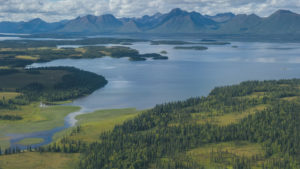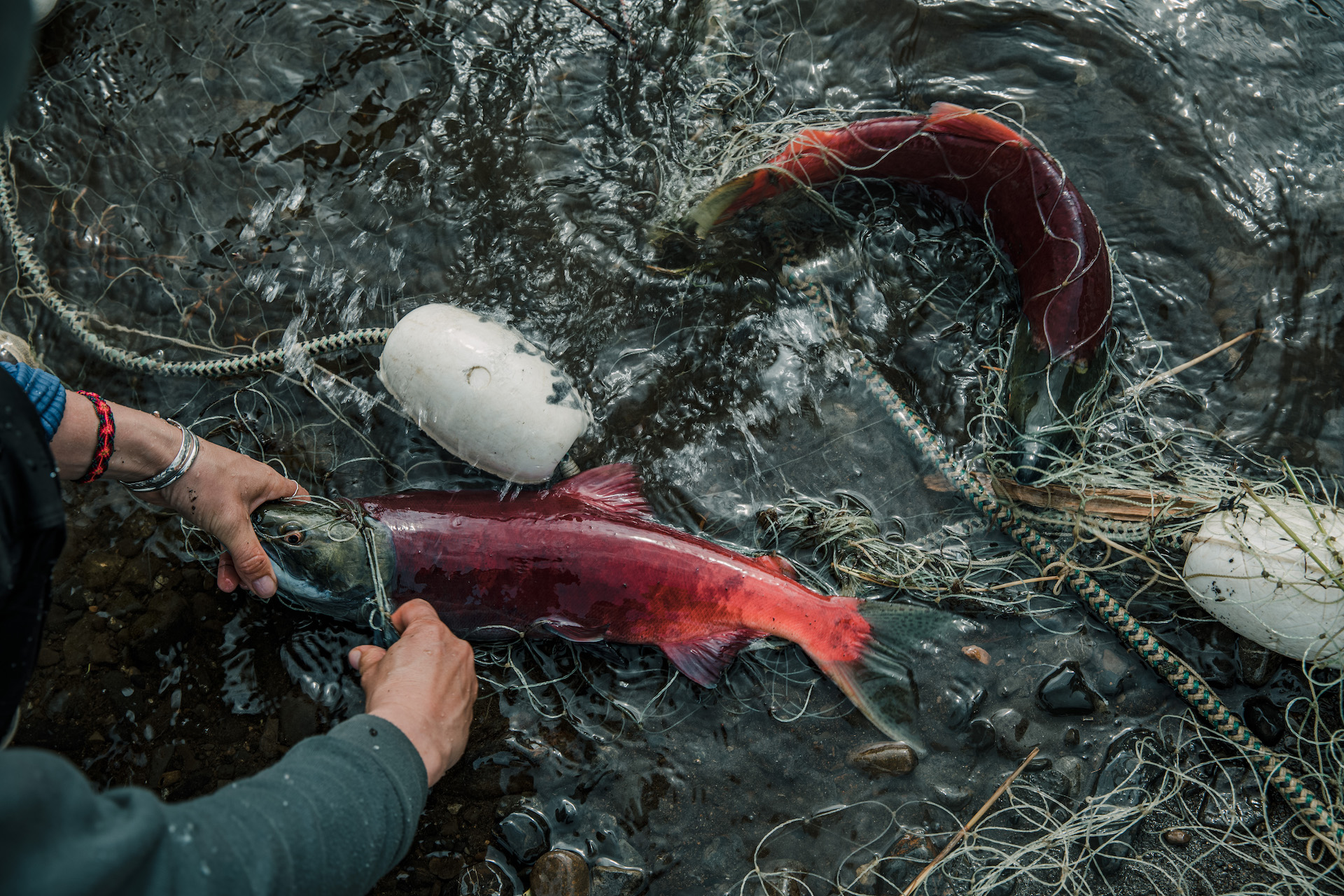The State of Alaska has taken its case directly to the United States Supreme Court, the bench where Samuel Alito currently sits, in an eleventh hour effort to resurrect a giant, open pit copper and gold mine, proposed for land in western Alaska that flanks two of Bristol Bay’s renowned salmon spawning watersheds.

Alaska Attorney General Treg Taylor acknowledged that the petition is “extraordinary” but claims his state has a “sovereign right to regulate its own lands.” The U.S. Environmental Protection Agency ruled last year that the Pebble Mine proposal violates the Clean Water Act by imperiling the world’s greatest sockeye salmon fishery.
Mineral extraction is, argues the state’s brief, “critical to the continued well-being of Alaska, which has long relied on its resource-rich lands to fund the state and local governments.” But the salmon runs of Bristol Bay support 14,000 jobs and yield an annual income averaging $1.5 billion. An average of 57 million sockeye have returned annually in the past decade.
The EPA was urged by Senator Maria Cantwell, D‑Washington, to use the Clean Water Act and carefully assess impacts of the proposed open pit.
The federal agency concluded:
“Discharges of dredged or fill material to construct and operate the proposed mine site alone would result in the permanent loss of approximately 8.5 miles of anadromous fish streams, 91 miles of additional streams that support an anadromous fishery, and approximately 2,108 acres of wetland and other waters.”
The proposed mine has drawn opposition from commercial fishers, Bristol Bay native corporations, sport fishing lodges and environmental groups.
Even the late Senator Ted Stevens, Alaska’s premier boomer politician, who wasn’t very fond of Cantwell, was suspicious of the project. A close friend of Stevens owned a home nearby at the gateway to Lake Clark National Park.
The Trump regime appeared ready to have the Army Corps of Engineers green-light the project, only to meet opposition from family and cronies of the 45th president. Two sons of his, Donald Trump, Jr., and Eric Trump, have stayed at the lodges. Even ex-FNC host Tucker Carlson came out against the mine.
Donald Trump, Jr., posted a picture of himself and son hoisting a salmon with the message: “The headwaters of Bristol Bay and the surrounding fishery are too unique and fragile to take any chances with the Pebble Mine.”
The Supreme Court, in a 6–3 ruling earlier this year, restricted the EPA’s ability to protect the nation’s waterways.
But the high court has a conflict of its own.
ProPublica recently disclosed that Alito took a pricey Alaskan vacation to the King Salmon Lodge, located in the Bristol Bay watershed.
Alito did not report the junket, taken on a private jet owned by hedge fund billionaire Paul Signer, a trip that would have set the justice back at least $100,000 had Alito chosen to foot the bill. Alito was hosted at the lodge by another major Republican donor, Robin Arkley II. Leonard Leo, head of the conservative Federalist Society, arranged the trip.
The mine proposal is the brainchild of Vancouver-based Northern Dynasty Minerals and its Pebble Limited Partnership. Two of the world’s largest mineral conglomerates, Anglo American and Rio Tinto, long ago pulled out.
Leading jewelry firms, notably Tiffany and Ben Bridge, have opposed the mine. So have such prominent chefs as Seattle’s Tom Douglas.
Three years ago, two activists of a group called the Environmental Investigation Agency posed as potential Hong Kong investors and made videos of two top Pebble executives boasting of their backstage influence over Alaska politicians. They also spoke of expecting a $1.5 billion state subsidy of the giant mine.
Of Senator Lisa Murkowski, R‑Alaska, Pebble executive Tom Collier observed: “She says things that don’t sound supportive of Pebble, but when it comes to vote, when it comes to do something, she never does anything to hurt Pebble, O.K.?”
The blowback was instantaneous.
Senator Murkowski fumed at the hint of duplicitous behavior and came out against the Corps issuing a permit for the mine.
Senator Dan Sullivan, R‑Alaska, then engaged in a tight reelection race, tweeted: “I oppose Pebble Mine. No Pebble Mine.”
The Bristol Bay Defense Fund, a coalition opposing the mine, described the state’s latest lawsuit as “little more than a publicity stunt filed on behalf of an unscrupulous mineral company, Pebble Limited Partnership, (that) has repeatedly misrepresented its record and misled regulators, its investors, Congress and the general public.”
The Puget Sound region has skin (or scales) in this game.
An estimated 1,100 Washington fishers have license to cast nets in Bristol Bay. Washington is a major center for fish processing.
Senator Cantwell has fought the mine for more than a decade, stressing that Bristol Bay is an enormous economic as well as natural resource.
The legal bid to revive Pebble comes as the Biden-Harris administration faces a dicey decision on another major mineral deposit. Ambler Metals has estimated there is $7.5 billion worth of copper in a deposit north of the Arctic Circle in the Brooks Range. A mine would produce metals needed to make batteries and wind turbines, and other elements of the administration’s “green” agenda.
Yet, the mine would require construction of a two hundred and eleven mile haul road. It would cut through pristine wilderness, cross eleven major rivers, and cut across the migratory paths of thousands of caribou. The road would travel twenty-six miles through Gates of the Arctic National Park and Preserve.
Due west of the mine site is Kobuk Valley National Park.
The Biden-Harris administration has sided with fisheries and conservation groups in defense of the Bristol Bay fishery. It has halted logging of old growth trees and new road construction in the Tongass National Forest of Southeast Alaska. And it has halted new oil and gas leasing in the Arctic National Wildlife Refuge, west of Prudhoe Bay on Alaska’s North Slope.
At the same time, the administration has okayed Conoco-Phillips’ ambitious Willow project, an oil and gas development west of Prudhoe Bay.
Environmental groups have bitterly opposed Willow, arguing that it will be a major emitter of greenhouse gases at a time when the Arctic is warming at a pace faster than the rest of planet Earth.
The impacts of global warming are visible in The Last Frontier. Melting permafrost has forced closure of the road across Denali National Park.
So-called “drunken forests” can be seen across north and central Alaska, trees leaning in all directions due to permafrost melt.
No longer protected by an early-forming ice pack, coastal villages are being battered by fall and winter storms off the Bering Sea.
The state’s great tidewater glaciers are in rapid retreat.
The Muir Glacier no longer reaches Muir Inlet in Glacier Bay National Park. The Portage Glacier is no longer visible from the Portage Bay Visitor Center south of Anchorage. The Columbia Glacier, in Prince William Sound, has calved icebergs into the path of oil tankers leaving Valdez.

